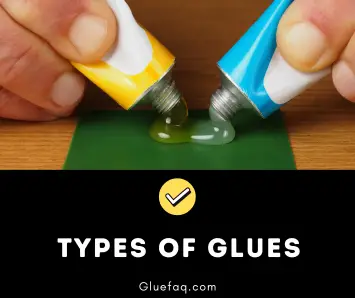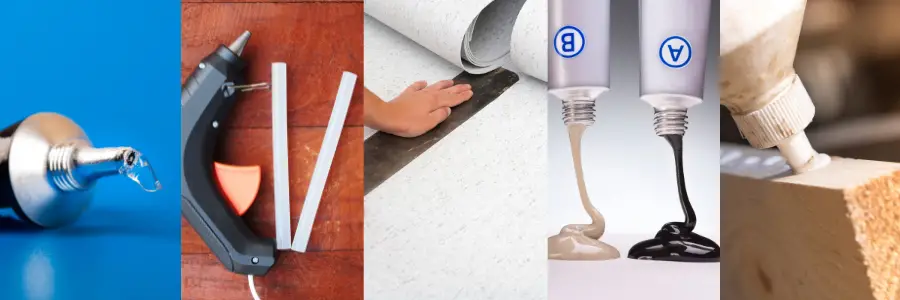Glues are substances that are used to bond two or more surfaces together. They come in a variety of types, each with its own unique properties. Some glues are designed for specific purposes, while others are more versatile.

Here are some of the most common types of glues:
- PVA glue: This is a type of water-based glue that is commonly used for arts and crafts. It is easy to use and dries clear.
- Hot glue: This is a type of glue that is melted and applied with a glue gun. It is a fast-drying glue that is good for bonding a variety of materials.
- Superglue: This is a type of cyanoacrylate glue that is very strong and dries quickly. It is good for bonding small objects together.
- Epoxy glue: This is a type of two-part glue that is very strong and durable. It is good for bonding large objects together or for repairing items that are under a lot of stress.
- Wood glue: This is a type of glue that is specifically designed for bonding wood. It is strong and durable, and it is also water-resistant.
In addition to these common types of glues, there are also many other specialized glues available. For example, there are glues that are specifically designed for bonding metal, plastic, or glass. There are also glues that are heat-resistant, waterproof, or weatherproof.
The type of glue that you choose will depend on the specific project that you are working on. If you are not sure which type of glue to use, it is always best to consult with a professional.
Comparison Between Common Types of Glues
Here’s a comparison table showcasing the features of each glue type side by side:

| Glue Type | Water-Based | Usage | Drying Time | Strength | Suitable for | Special Properties |
|---|---|---|---|---|---|---|
| PVA glue | Yes | Arts and crafts | Clear | Moderate | General purpose | – |
| Hot glue | No | Versatile | Fast | Moderate | Various materials | – |
| Superglue | No | Small objects | Quick | Strong | Small projects | – |
| Epoxy glue | No | Large objects, repairs | Slow | Strong | Heavy-duty tasks | Durable |
| Wood glue | No | Wood bonding | Moderate | Strong | Wood projects | Water-resistant |
How to Choose the Right Glue
When choosing glue, there are a few factors that you need to consider:
- The materials that you are bonding.
- The strength of the bond that you need.
- The environment in which the bond will be used.
- The ease of use.
- The cost.
Once you have considered these factors, you can start to narrow down your choices. There are many different types of glues available, so you should be able to find one that is right for your project.
Here are some tips for choosing the right glue:
- Read the label carefully to make sure that the glue is compatible with the materials that you are bonding.
- Consider the strength of the bond that you need. If you need a strong bond, choose a glue that is rated for the weight and stress that the bond will be subjected to.
- Think about the environment in which the bond will be used. If the bond will be exposed to water, heat, or other harsh conditions, choose a glue that is designed for those conditions.
- Consider the ease of use. If you are not comfortable using a glue gun, choose a different type of glue.
- Compare prices. Glues can vary in price, so it is important to compare prices before you buy.
Using Glue Safely
When using glue, it is important to follow the safety instructions on the label. Some glues can be harmful if they come into contact with your skin or eyes. It is also important to keep glue out of the reach of children.
Here are some safety tips for using glue:
- Wear gloves when using glue.
- Work in a well-ventilated area.
- Keep glue away from your eyes and skin.
- If glue gets on your skin, wash it off immediately with soap and water.
- If glue gets in your eyes, flush them with water for 15 minutes and seek medical attention.
Storage and Disposal
Glues should be stored in a cool, dry place. Once a glue has been opened, it should be used up as soon as possible. Unused glue can be disposed of in the trash.
Conclusion
There are many different types of glues available, each with its own unique properties. The type of glue that you choose will depend on the specific project that you are working on. By following the safety instructions and storing and disposing of glue properly, you can help to ensure that you use glue safely and effectively.
